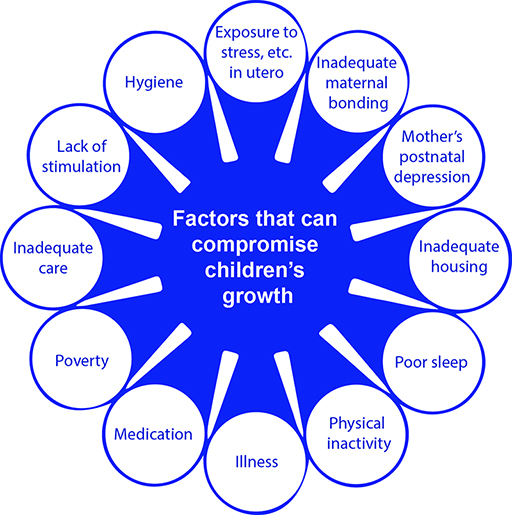1.4 Factors that can compromise children’s growth
Figure 3 shows factors that can compromise a child’s physical growth.
Exposure to stress, alcohol or smoking in utero
It is very important that effective antenatal care helps pregnant mothers provide the best environment for their growing babies. Stress, alcohol and smoking are all known to have a negative effect on the growth of babies in the womb. Data for 2021/22 show that 9.1% of pregnant women are smoking at the time of birth (NHS England, 2022).
Inadequate maternal bonding and/or postnatal depression
In the UK, 2.3 million children are living with risk due to a vulnerable family background (Children’s Commissioner, 2019). In some cases, inadequate maternal bonding and postnatal depression can contribute to this and so it is critical that health professionals are available to all parents to pick up any difficulties. 829,000 children are also ‘invisible’ (Children’s Commissioner, 2019) – i.e. they are not known to health services – these are children who may not attend preschool and are not accessing appropriate support.
Inadequate housing
Inadequate or unsafe housing environments mean children may not have opportunities to move freely and play – they may also be prone to picking up infections that affect their breathing.
Poor sleep
All children need quality sleep in a clean, safe and secure environment. Some children may be living in chaotic households or are constantly moving and have no sleep routines, continual access to screens, and no proper bed. Some may also experience disturbed sleep due to illness e.g. a persistent cough.
Physical inactivity
Children need to move in order to be safe and strong. Being physically active ensures the muscles properly support the joints and reduces the possibility of accidents and fractures.
Illness
Some children may be managing long-term health conditions, experience operations and may be prone to picking up infections.
Medication
Medication for long-term conditions, e.g. asthma or coeliac disease, may have an adverse effect on children’s rate of growth.
Poverty
In the UK, an estimated 14.5 million people are living in poverty, which represents 22% of the population. (Save the Children, 2023). Of these, 4.3 million are children. According to the Joseph Rowntree Foundation (2023), for the last 25 years, children have been the demographic most affected by poverty that means they are living on less than 60% of the national average income. This will have an effect on the choices made around food, clothing and where and how they can play.
Inadequate care
Some children may experience neglect and abuse – both will have a negative effect on their growth.
Lack of stimulation
This may be physical or emotional and affects their ability to thrive.
Poor hygiene
Ensuring good personal hygiene will help minimise the possibility of picking up bacterial infections.
Activity 2
Read the case study about a mother of three below and then answer the questions that follow.
Case study: Mel
Mel has three children under 5 years old and they live together in a small flat on the fifth floor of a tower block in a city. She has family living locally who are supportive, but she has a range of health issues and her financial situation is challenging.
Which three factors included in the list of ‘compromising factors’ do you think may be most relevant to her life?
How would you advise Mel to best support her children’s physical growth?
Discussion
This is a tricky situation for Mel, and there aren’t easy answers. The compromising factors that may be most relevant to Mel and her children could be that they live in housing that is inadequate for young children. This is because the children can’t access a safe outdoor play area very easily. Mel’s illness may make her feel less able to get the three young children ready to go to a play area.
In addition, Mel doesn’t have much spare cash because of her financial situation. Mel could be encouraged to seek the support of her family to take the children outside to a safe play area. Mel could be encouraged to find out from her Health Visitor about play groups and services that may be available in the community that they could access.
You may have thought of other ways that Mel could be supported.

